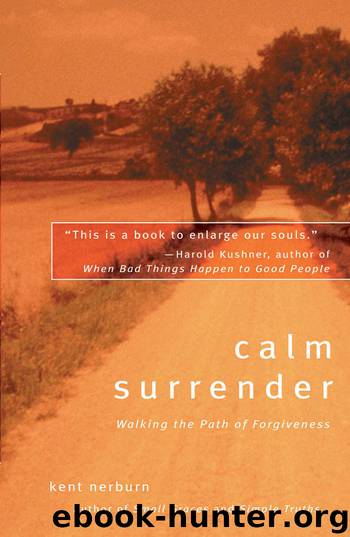Calm Surrender by Kent Nerburn

Author:Kent Nerburn
Language: eng
Format: epub
ISBN: 9781577313274
Publisher: New World Library
When we are victims of faceless injustice, true
forgiveness demands that we generate love.
Chapter 5
The Message Tree
I am standing beneath a large and ancient cottonwood tree in a shallow ravine in the far corner of northwestern Minnesota. A few feet in front of me a lazy flat-bottomed river meanders languidly between several low hillocks. The water is clear; I can see small fish moving between the shiny round rocks. On the far bank, maybe thirty yards away, a tangle of saplings and low, brushy undergrowth spreads out toward the base of the hillocks. To my right, patches of low meadow have formed in the oxbows where the river bends, and prairie birds trill and chirp from their perches in the tall grasses. Occasionally the splash of a redwinged blackbird cuts across my vision as it darts low over the meadow. Swarms of insects pool and buzz against the morning prairie light.
This is not a place many people would stop. The heavy stands of northern pines were left behind an hour ago, and the great expanses of rolling plains are still half a day’s journey to the west. This is “get across” country — prairie flatness so great and empty that the full moon rising above it seems like the eye of God — solitary, singular, and all-seeing.
A few small towns pierce the horizon — tiny huddled settlements with French names like Huot and St. Hillaire, bespeaking the voyageurs who came here to trade with the Ojibwe Indians several centuries ago and ended up staying, either because they had taken Ojibwe wives, or because they had lost touch with the part of themselves that required civilization, and had replaced it with something wilder, more elemental, more irresistible.
I have always loved this great open country and these dying prairie towns. There is something peaceful and melancholy about them, like sad memories grown warm with age. They never really belonged here. The land was too harsh and unforgiving. For a generation or two they thrived — main street enclaves of two or three hundred people, set a dozen miles apart, each with its own church and school and hardware store and cafe. But now they are almost abandoned, and are left only to the few remaining store owners and old men in pickup trucks who gather daily at the local cafe to discuss the weather or the crops or the ills of a world that has stolen their children from them, leaving them to watch the town and the lives their fathers built dry up and blow away.
Despite the ceaseless labors of God-fearing hands, the deep winters and rocky soils mocked the efforts to create an agrarian lifestyle. These were lands better suited to yielding seasonal bounty to people passing through — people like the Ojibwe, who once called this land their own, and had it taken from them at the very site where I am standing, here on this still and lonely riverbank forty miles from the Canadian border.
I am listening closely. The
Download
This site does not store any files on its server. We only index and link to content provided by other sites. Please contact the content providers to delete copyright contents if any and email us, we'll remove relevant links or contents immediately.
The Compound Effect by Darren Hardy(8966)
Wonder by R.J. Palacio(8580)
Atomic Habits: Tiny Changes, Remarkable Results by James Clear(8343)
Becoming Supernatural by Dr. Joe Dispenza(8217)
Wonder by R. J. Palacio(8109)
Change Your Questions, Change Your Life by Marilee Adams(7780)
The Road Less Traveled by M. Scott Peck(7603)
Born to Run: by Christopher McDougall(7127)
Daring Greatly by Brene Brown(6512)
Big Magic: Creative Living Beyond Fear by Elizabeth Gilbert(5771)
Grit by Angela Duckworth(5614)
The Slight Edge by Jeff Olson(5417)
Men In Love by Nancy Friday(5240)
The Wisdom of Sundays by Oprah Winfrey(5160)
You Are a Badass at Making Money by Jen Sincero(4930)
Fear by Osho(4738)
The Miracle Morning by Hal Elrod(4727)
The Four Tendencies by Gretchen Rubin(4601)
Rising Strong by Brene Brown(4459)
